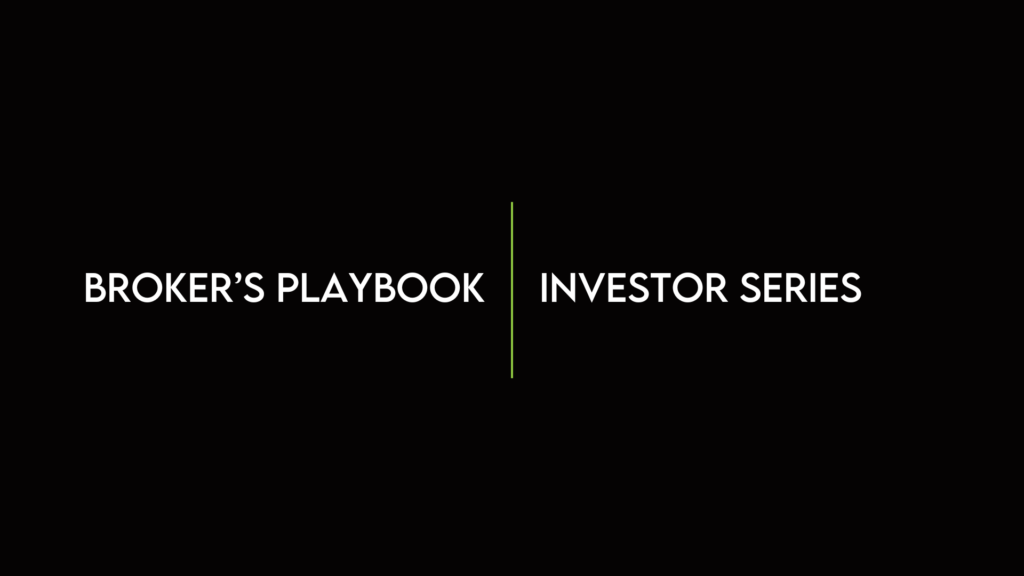
EP 47 – How the Right Mindset Can Make You A Millionaire w/ Pankaj Sharma | Broker’s Playbook
Simeon Papailias: Good morning, everyone, and welcome to this episode. This episode is going to be all about pivoting your business based on the opportunity that is put in front of you and how to manage change inside your business. We’re going to be joined today by Pankaj Sharma, CEO of Highbridge Capital, and my amazing co-host, Ms. Laura martin. We’re going to go through his story and try to take out some of those nuggets that are going to help us within our opportunities in pivots. Good morning, Pankaj. Welcome to the show. Good morning, Laura. Nice to see you again this morning.
Pankaj Sharma: Good morning, guys. So excited to be here. Thank you for the opportunity.
Laura Scarlett Martin: We’re so happy to have you. Pankaj and I have known each other for just a year and a half or two, about the same length of time that Simeon and I have known each other. And just seeing your growth, Pankaj has been amazing. We reconnected recently and I was so thrilled to see that you had started as a CEO of a brokerage and then pivoted into becoming a home builder, which is just such a big game play. And I know you’re just so passionate about all things real estate, so I was hoping you could share with us what this journey has been like for you.
Pankaj Sharma: Yeah, I’m very grateful for this opportunity to share this and if it can help our listeners as well. So like Simeon mentioned, I am a CEO of a mortgage brokerage based out in GTA in Toronto area, and like most of the mortgage agents and brokers like my focus up to the last year for the last four or five years was all on Mortgages, How to Grow the Book of Business. And we were specializing in private lending. So we were always as a team, a solution based lender, and we were always looking for complex problems to help our clients. And through that journey, we came across an opportunity to help a builder buy some land in Toronto region and they were looking to develop some luxury products. And in that opportunity, when I started looking a little deep into the product, I learned that the product they are working on or we are working on is none to anything else out there, especially knowing what products our builders are building and and kind of quality and the craftsmanship RAW is bringing into those products. It really excited me to be a part of it in.
Simeon Papailias: More than what is what is that product, If you don’t mind me asking, Pankaj, where did you see the gap in the market?
Pankaj Sharma: So mostly like, for example, like I’ll just take a very like a generic example. I went to a home building process myself a couple of times, and I learned when builders are building a home or they are choosing the materials like the first thought most of the people lead with is what’s the cost of it? You know, how how much the cost is, can we like cut the corners? Can we do like maybe use a behind the wall stuff? Not necessarily the best quality, but like in front, everyone wants to show like, you know, the glitters. And when I started getting into the process of Raw and how they were building, they were using like real materials, like real stone, marble glass, real wood, no fake plastic material. So it was very earthy, like feeling to the homes and the structural component to it. So everything from the design element to the experience throughout the pre-sales was designed to while the client, just like Apple does, just like Tesla does. So that’s what really got my attention with their product.
Laura Scarlett Martin: Wow. I can’t say how much that was needed in the market. There’s so many McMansions and just development projects that are slapped up with so many corners cut, as you were saying. So I mean, Simeon would know all about that being the construction king himself.
Simeon Papailias: A quick question. Did you find that the client or end user appreciated the the authenticity and the build and the use of real materials? Or did you get feedback saying that it would have been better off to have the project cost 200 K less? Well, how was the project received and how are your projects received? Are you attracting the right audience by sticking to real materials?
Pankaj Sharma: Yes. So it’s actually I’m very excited to share someone that I was lucky enough to be a part of the sales process where I am not a real estate agent, but because of being a mortgage guy, I was able to be in those meetings and I was really fascinated to see that the clients, the end user, really appreciate those things. In fact, the comment we continue to get from clients was You are too good to be true. So the only reason I don’t want to buy is because I want to see this happen first, then believe it. So that was like almost a reaction. But no, nobody actually cautioned. What we are trying to do and in fact, so far we have sold six projects without even like building them. So we pre-sold and five of them got sold within like two days of being on the market. And the price range is between 2.2 to 5.1. So it’s a luxury product and we sold it to the first client we came across. So like literally the first or second client we met, they bought it and somebody who then bought it, they came back to buy it again. So we are receiving an amazing response.
Simeon Papailias: That’s that’s absolutely incredible to hear. I’m going to I’m going to take you back. Tell me a little bit about how your journey started in mortgage brokering and kind of how how it evolved to be full blown design build construction. So tell me about you’re the CEO of Bridge Capital. Tell me a little bit about Eye Bridge. Where did it start? Where did you start? Tell us a little bit about your journey and how you evolved.
Pankaj Sharma: Yeah, I would love to. It’ll be a couple of minutes like story, but I’m going to start from little back. So I moved. I’m an immigrant to Canada. I moved to Canada almost nine years ago from India, and I had a sales background. I had understanding of investments, a little bit of credit, but not necessarily like the language and the culture kind of integration in Canada. So when I was new here, immediately I was fascinated by financial industry. And then with my previous knowledge, I started kind of learning how to get enter into a financial industry. What do I need, what skill set do I need? So soft skills I did had, but the hard skills I learned English. I learned like just a general like flow of how financial terminology work. So from there, my journey started. I was able to get a job at the bank. Very soon after landing here, I started learning the financial system, how the credit works, how investment work, kind of identified my niche. Where I was more attracted was lending. And after a couple of years at the bank, I learned mortgages and decided to pursue my own mortgage journey and joined the broker six years back. And this broker, lucky for me, was very efficient in doing private lending. And since the beginning of my career, 20 years back, I was always fascinated with things which were complex, like in sales, like I would go for like the most difficult sales data to understand why is it not happening? So private lending for five, six, six years ago was a similar kind of terrain. Not a lot of brokers were understanding it and everybody was like just copy pasting, you know, like stuff. Nobody really helped. Your client tried to understand why do you need a private mortgage? How are you going to get out of it? That kind of difficult stuff.
Simeon Papailias: I love what you said, copy and paste because I just read a quote the other day. You can’t copy yourself to your authentic self, so it’s you got to make your move. Why do you think the financial industry resonated with you? Because I have the same disease as to liking complexity. It seems like I can never in my life ever have a simple day. I attract complexity. I appreciate it. What? Where do you find you like? Is it the challenge of it? What is it that resonated with you with the financial instruments, specifically mortgages? Mm hmm. So again, a.
Pankaj Sharma: Little like backstory. I would fully own to that. Before landing in Canada, the intent to be in financial industry and solve complexity was to make money, because obviously I was into stocks and bonds and derivatives, and that’s where the most money was. So it was money driven in the beginning. But after I landed here and I was a part of a bank and I started understanding that doing the right thing here, especially in this country, takes you very far. So like, if you do the right thing, give the right advice because it’s a cycle. Like client is not going to only buy once they’re going to buy five times, they’re not going to know ten people. So if you have like the right mindset and you hedge 100 people the right way, that said, like you, you can build $1,000,000 business for the rest of your life sitting at home. So so that was my intent to to enter into financial industry. And I did notice the gap. I saw a huge gap, especially with the banks. They were lending money to somebody who was not looking really good on paper, but they were not lending money to somebody who was looking good on paper.
Pankaj Sharma: It was it was really weird. So I started noticing this kind of discrepancy in how financial system was running and not that I wanted to change it, but I was like, okay, I don’t need to follow the suit. I can understand what makes my modeling stick. So private lending, it was and especially like, right, I think five years ago, I’m sure you guys must have noticed this too. Like people were finding them in first mortgages a lot. So first mortgage market kind of erupted a few years ago, so people had no idea. Like, so, you know, brokers were charging 4%, 5% fees and because like, you know, everybody was making equity. So right there we saw an opportunity and we were like, okay, what if we start charging 1% or 2% reasonable fee and give a better product to the client, a shorter time frame, give them a refinance? So that was our business model, like help them get them in a regular mortgage. They come back, we buy them more. So that’s where we started.
Laura Scarlett Martin: Awesome. So, I mean, I know I was helping you build out your your team a bit. And I feel like that’s the hardest thing is scaling. Right? You can be a really great broker. And the problem is, how do you duplicate yourself? How do you transition from being an excellent person at sales, an excellent person in terms of understanding their products and what you’re able to do for a client to someone that is recruiting, training, getting marketing, giving them leads, staying on top of them, motivating them. And so can you talk a little bit about that first transition that you had to make from broker to broker owner?
Pankaj Sharma: Yeah, I remember I reached out to Laura because I saw Laura and Sean doing amazingly well, building Matrix on premise of more or less what we were looking to do. And then I was I must own to it. Like I was under the impression that if I can crack this code, I can help other mortgage agents crack this code. And I think I started breaking down the process of what’s helping me. Maybe these things will help them to, but I have no shame in admitting I was wrong. To a very large degree, like I did manage to build a team of up to 25 mortgage agents. But because I have because I haven’t really went through the tranches myself long enough, I couldn’t understand certain aspects of the business. That’s where, like I started understanding that it wasn’t really profitable for me to scale mortgage agents. It was more profitable for me to focus on what my core competencies were and build a business around it rather than trying to replicate myself in the mortgage agent, which is again, like it’s their responsibility to do the work. I can’t really do the work. So that’s a hard lesson I learned and that’s where I opportunity presented and I pivoted and. Yeah.
Simeon Papailias: Before we go into your pivot, I want to point out something that you said that really, really, really struck a nerve. Because you don’t have an ego, because as a very successful man, CEO and director of multiple companies, you have no issue saying something like, I realized quickly that this was not my lane and I needed to focus on my core competencies as opposed to making excuses or otherwise nonsense that so many people get caught up in because they just can’t let go of something that didn’t work out the way they thought and they feel they owe something to someone to keep piling on it and building more crap and actually not assisting in people’s lives because they can’t get out of their own way. So before we speak to your pivot, in order to pivot, you have to have a clear path. In what? In what you just mentioned is I stop. I wanted to focus on my core competencies and I was about to pivot. So I do want you to continue because I want to hear the pivot and exactly your mindset. But huge kudos to you for being able to identify, absorb the flaw, the mistake, the the non core competency and just get the hell out of your way and get into where you excel. And doubling down on that. I just wanted to mention because that is a huge character flaw or character advantage depending on which side you you fall under as to how quickly you can succeed and adapt to change. So back to you, Pankaj. Please go on. And you left off at your pivot once realizing your core competency was elsewhere.
Pankaj Sharma: No, thank you, Simeon, for pointing that out. And I would like to say one more thing around that crucial moment, because I also feel like I was also stuck in that ego where I always figured out a way out of situation. That’s who I was. That’s how I have built myself. Like get into a situation where nobody can find a solution and do it. So I was in that mindset. Life and people around me created that stop for me, and I had no other option but to look in the mirror and really acknowledge that I’m failing miserably bad in this. I am just not acknowledging it. And I had no other option but to just accept it and like a little philosophy at touch. Like we’ve heard that comment. If you surrender, the universe opens up to you. So I literally, like acknowledged my failures. And right there there was an opportunity for the.
Simeon Papailias: And I don’t think that’s a coincidence, by the way. I don’t think it’s a coincidence at all. The opportunity was always there waiting for you to see it. You were not ready for the opportunity.
Pankaj Sharma: But you just nailed it. And I also feel like sometimes life wants us to go through certain hardship for us to acknowledge what’s in front of us. Right. Like, we don’t do that. So yeah, so pivot was pretty remarkable, too, because it wasn’t intended. Like I said, I was in this mindset. I want to build a company helping private mortgages. I want to bring like 20, 30, 40 awesome people like myself, and we do really good things. That was the mindset then. Rod Sanctuary was one of our clients. A quick story, so one of their deals went sideways on the day of closing and the founder, he was in a silent retreat for one week and before getting into the retreat, he mentioned it to me. He’s like, Can you please handle this? I don’t want to just like anyone to disturb me. Is it all done? So we have papers signed, lawyer You know the spiel. Everything was done at the last hour. Something came up, the deal went sideways, and it was a very crucial deal at what stage we were in. Like we were in front of investors. So there was a lot riding. And I guess my, my value. One of the values I live by is taking extreme accountability of not only my actions of people who are associated with me. So one of my colleagues dropped the ball and last minute they said, We can’t do anything. And I was able to like really take clear accountability. I reached out to everyone. I said, It’s my fault. I promise you, give me three days, we’ll get this done. And that’s where like the founder saw, he’s like, We are building a world class team. We are hired like the best people in the world to do what they do. And just because you have this attitude of just taking ownership, even if you are not the most competent guy to do what we are needing, well, we’ll give you an opportunity to continue on this journey with us. So that’s where like I got that opportunity and I just kept pivoting again within the company as well.
Simeon Papailias: Well, I’ll tell you, we have probably one of the the most successful pivot queens I have ever seen. Laura. Laura, you’ve gone in different industries in the last few years. You’ve dabbled in so much. What’s your take on successfully moving directions, shifting in navigating, changing winds? You’re in the middle of the lake, you’re going west, and all of a sudden you get socked right in the mouth and you’re going east. Tell us about tell us what your thoughts are on this journey from your own experiences.
Laura Scarlett Martin: Well, I mean, it’s similar like when you’re not really coming alive for for something anymore, when you’re losing that gusto. Yeah. Sometimes things are hard and you have to work through the dip, as it were. You know, things are always fun in the beginning, hard in the middle, and then they’re really easy and fun again once you create mastery in it, Right? So it’s really important to say, okay, if I’m going to do something, I need to be the best at it and I need to be in it for the long haul. And sometimes that means taking a hard look at yourself and saying, Is this something I want to be putting in the grind for and going through this these hard times to get to the other end? Right? Will there be this glorious moment when I’m at the top? So, you know.
Simeon Papailias: What’s the.
Laura Scarlett Martin: Industry that you want to pivot into and say, okay, is this the partner I want to do it with? Is this the opportunity to do it? What can I lose? What can I gain? Right. And if you can gain experience, if you can gain a possible massive opportunity, then you should do it. And a worst case scenario is it doesn’t pan out and you win or you learn, right? So that’s my experience.
Simeon Papailias: What’s your advice to someone there? They’re coming down a project exactly what I was saying, and all of a sudden somebody else drops the ball, whether it’s you or somebody else, I could care less. Extreme accountability is the only way. So that to me is a natural, a natural feeling and a natural reaction. So give me what your advice would be to someone in a moment of crisis during a project. No matter what that project may be. I don’t care if you’re doorknocking, if you’re sending flyers, all of a sudden something happens. How do you manage your thoughts and actions through a crisis in order to be able to facilitate a solution and be for your own sanity to come out on top and be able to continue and and keep tracking on? Where do you pull that mindset from?
Laura Scarlett Martin: I mean, I might let out about a stream of 25 curse words, and then I will break frame a mini ten minute break doing something else, journal out what’s going on or talk to someone that’s a good sponge, like not someone that’s trying to fix it, but someone that can just take what’s going on on your mind from you so that you’re clear, like create a clearing and then be in communication about what’s happening. Don’t tell them every single detail. Don’t overload the person on the other end. Just say, Hey, this is what’s going on. This is how I propose to fix it. Or if it’s not fixable today, this is when I can fix it by. And again, just try not to make excuses because that’s triggering for people, right? Like, if you’re if you’re going to do that and try and deflect blame for people that are real serious business leaders, they’re not here for it.
Simeon Papailias: I love that. Back to you, Pankaj. Tell me about the moments leading to you asking for three days to fix it so you realize there is an issue. You take accountability. What is your train of thought? How did you regroup? What did you do? So what? What was going through your head? Crisis happened. It happened. It’s over. The milk is spilled. What is your train of thought that regroup, replan and make a commitment to somebody looking at them in the eye saying, Give me three days. I got this. What is your train of thought?
Pankaj Sharma: Now? Yeah, I think first I would acknowledge, like Laura said. I won’t lie. I cried because for me, this was the biggest opportunity ever. Like, I actually looked at it like the biggest opportunity of my life. And now somebody else who I trusted accidentally are not knowingly drafted. So I cried like a baby for like a good 30, 40 minutes and my wife and my brother close to me and yeah. And they reminded me which I must share with our audience, that they said, Hey, look at you. Like, Who are you? Five years ago or ten years ago when you landed here, did you ever imagine you’ll have this opportunity? And, you know, when you put yourself and anybody can do this exercise, so you, you.
Simeon Papailias: You use gratefulness, you dug deep where you had to go. That’s as deep as someone can go when you go. I find when you go and say, who the f am I to deserve this to begin with? And you strip yourself of all the complexity and all the layers and all the successes, and you look back at your 25 year old self, your 20 year old self, your 15 year old self living in a trailer park. So so depending on how bad the situation is, I find you strip yourself successful. People remind themselves of the journey, and that is to keep it simple. You use gratefulness, meaning that I am way ahead of where I should be. Stop crying now. Stop swearing, Laura. Now get over yourself. You can see the F word, you can shed a tear. But at some point, you’ve got to move on. Select your pick yourself up. Get off the canvas. Pick yourself up next steps. What did you do?
Pankaj Sharma: Next steps. And then this is. This is something I have distilled and drilled over the years that no problem is difficult. If you break it down and try your best to break it down as small as you can, like for example, like ten, ten pieces of it, 20 pieces of it, like, you know, and then just pick one piece at a time and then just focus on that piece and then next piece. And it’s all about you just mentioned similar and it’s about keep going and not necessarily, you know, in a desired direction. Sometimes you have to go in circles too, because after a few cycles you’re going to start getting dizzy. And I’m like, I’m going in circles. As long as you are mindful, you’ll figure it out. As long as you know you’ll figure it out. So that’s that was a process. I started breaking it down. I understood where the ball was dropped. I understood, you know, what are the players? Who is going to fund it? I set the right expectations. That’s super important. I think in sales, people set wrong expectations and they oversell it and then they can’t really match what they have already sold. So I called a founder. He didn’t obviously pick my phone. I was even more devastated. I’m like, Oh, I lost my friend. He’s never going to talk to me when I call the CFO. And I went in, I’m like, You don’t know me. You don’t know where I started. 20 years ago, I was living in one room with my whole family.
Pankaj Sharma: Like literally, I was surviving on $50 a month for a whole family. And now I am where I am. Not because somebody handed me because I’ve been stopped. So I’m letting you know if I fail, I’m not going to ever ask you for a business. If anything, I’ll actually compensate you guys for all the nuisance we have created. So I’ll put money on the line if I fail. And he’s like, Yo, man, you got balls like you. I don’t know how you’re going to do it, so let’s figure it out. And again, earlier we were talking Universe Opens and here is a funny story. I went on LinkedIn, Some random guys just connected with me on LinkedIn, looked like a young guy. First message was like, I have money to lend. I called him. I remember one Sunday, I called him, had a two hour conversation. He was a young kid, 22 year old kid with his parents money. He’s like, Buddy, I’ll fund this. I’m like, Are you sure? He’s like, I’ll find it. And literally, like, my team was like, You’re crazy. You don’t know this guy. He met you just online. He was telling us the same story. What makes you think he’s going to do it? I am a gut guy. I’m like, My gut tells me he’s going to come through and he did come through on Monday. That’s incredible. You have to take your chances, right? I won’t say I haven’t heard that. But you take.
Simeon Papailias: The Nuggets coming out of this conversation and I’m going to move to towards a slow close because I want to hear kind of the end of where you are today, how you can create value in people’s lives and where people can reach you. That’s what’s next. But the nuggets of your story, just so you know, my man, is perseverance. In a time of crisis, you drop down as deep as you need to. You owe nobody nothing and nobody owes you shit that I will say with absolute confidence, because I’ve lived it many times. And I know as a fact Laura has lived it many times. And the truth of the matter is, when we need to to draw strength, we don’t need other people to give us strength. It’s nice to have support. It’s nice to have it all. But if you just remind yourself what you’ve done and where you come from, typically, typically it’s more than enough to look around you and to say there is a broker’s playbook board behind me. This started from the kitchen counter for fun. Yep. If the audio doesn’t work today, who gives a shit? So it doesn’t matter what it is. Strip it down. You set about the problems one byte at a time. You don’t eat an elephant hole, take the problem, dissect the daylights out of it until it’s easy. And it’s comfortable. Take the time you need to spin in circles because eventually you get dizzy. You said you’ll realize you’re in the wrong lane. Mm hmm. So I just wanted to bring those two, three playbooks out before we go into kind of the happy and easy talk of what you’re working on today and how we can work together. But as far as passing your knowledge, I think you have an absolutely beautiful story of perseverance and hard work and, of course, being bold in your actions to move forward and make the commitments that you made. So I couldn’t be happier thus far. Laura, why don’t you take Pankaj through the where we are today and how can he create value?
Laura Scarlett Martin: I mean, one thing that is so cool about Pankaj, his story is that and mine too. I think probably you too, Simeon, because he went from like you’re in the restaurant industry and other industries and you moved into real estate. And the funny thing is, whenever you pivot, whenever you move into something new, you’re going to get mixed kind of feedback from people that are around you. A lot of it will be negative and you’ll find out who your cheerleaders are, who the people that really just want you to win are, and who are the people that are really projecting their own limitations and insecurities on you are. And that doesn’t mean that they’re a bad person. That means that they haven’t really grown to the level where they can be supportive because they’re not really integrated with themselves. So, Pankaj, tell me a little bit about some of the the pushback you got when you did make that pivot.
Pankaj Sharma: So it’s going to be a little more personal. Like I, I invested a lot of time, emotions and energy knowingly and not knowingly in people around me. And it’s like I almost created a success for them in my head. And if that success wasn’t met for them, I felt a failure within myself. It’s like I took ownership for somebody else’s success, and I’m so deeply bonded to that part that I was getting. So for example, when this whole moment was happening for me last year, not that people started leaving me, but they stopped kind of believing in me. And that’s where it emotionally really hit me hard. And it was like, you know, I for the first time in my life, I really started kind of questioning myself and my own confidence within me because that was the very crucial moment. Some of the very close people who were always championing me, almost like putting my name on the wall, like, you know, like the cheerleaders, like the biggest cheerleaders all of a sudden turned their backs because they stopped believing in me or they saw, like some discrepancies in how I wanted to be then who I was. So like I said, there was a lot of pushback. But again, I don’t want to focus on those negatives. I do want to focus there are a lot of amazing people around all of us, and when we are in those times, they also support us.
Pankaj Sharma: They gave me really good advice. They ask me really hard questions, you know, like some of the people ask me questions like I never asked myself. So. So yeah. So through that combination, through a lot of mindfulness myself, I’m a big believer in personal growth, a champion like mind, body, soul, the combination. So all of that together was able to give me space for that clarity and build that confidence back and really understand that what am I really doing best here? Like I asked myself, What do you do really, really well, forget about mortgages because you can sell real estate, forget about everything. Don’t focus on product. What can you really do? Well? And my answer to myself was, I can talk to anyone on the planet and be comfortable with them because I look myself in their eyes. That’s my superpower. And that’s what I went to. The founder. He said, What can you do? I said, I haven’t raised the money, but if you tell me to raise money, I’ll raise money. I have never bought a land. If you tell me to find land, I’ll find it. But like you tell me.
Simeon Papailias: What I’m going to be honest with you, bro. I’m going to be honest. You are oozing heart and emotion, which is, I do believe human connection is your superpower.
Laura Scarlett Martin: I believe it, too.
Simeon Papailias: You’re a very emotionally intelligent man, and you’re making me have the feels like like I feel your intensity because your heart is so full and the world is a better place because you’re here. So I couldn’t be more happy to hear this story this morning. Man, It’s what a great story.
Pankaj Sharma: I’m super appreciative of that. Thank you very much for kind.
Laura Scarlett Martin: Yeah. And Pankaj is such a great example of someone that, again, has done the work on himself, has really found his strong suits and said, you know what, I’m not going to network with people for what I can get out of them today. I’m literally just genuinely interested in everyone, regardless of your usefulness or perceived usefulness. Either way, I just want to know you as a person. And he collects people. He collected me when my heart. Now you’ve got a bromance for Pankaj. No wonder. And it’s just how can you not win at that point, right? Because you just you’ve done the right things. You realize that you’re part of the fabric of society and you’ve never been judgemental towards people in terms of, you know, Hey, can I make money off of you?
Simeon Papailias: Mr. Sharma Tell us a little bit about where people can find you. Are you on the Gram Facebook website? What is your preferred method of communication and why is somebody reaching out looking for you?
Pankaj Sharma: Um, I think that something I got passionate about last year was somehow not necessarily teaching, but sharing this formula I have built myself of how do we connect with people? How do we I was calling it Ignite our superpowers. Like how do you become like that guy who can just go in any room? And so when I started doing that, I’ve been active on LinkedIn, I’ve been active on Instagram, and I can help people kind of break through their own barriers to communication or networking and help them understand that something I have really mastered myself, like when I see mortgage agents and real estate agents and they’re like, How do I find clients? Like you’re meeting at least ten people every single day because you are not really mindful. You don’t see it. It’s like, Where do I meet? I’m like, You go to Tim Hortons. There’s a girl who handing out that coffee to you, there’s a guy behind you. You can literally buy $5 coffee. And have a sticker of you. Thank you. Buy some. Do whatever. There is 100 ways to acknowledge people you can go to grocery store. And I don’t want to brag much, but I have literally picked up dog poop and picked up a ten grand cheque right next to it because there was another guy picking up a dog poop. He ended up becoming my client. And it’s just that the idea is not really to sell. The idea is to genuinely connect and leave those seeds all the time. And imagine, like within two months anybody can have 100 connections. But we are so hyper focused on what I want and if I’m not getting it, check. So that’s my message to everyone. And if anybody wants to learn that more, I’m very open. How to identify opportunities when that doesn’t exist.








